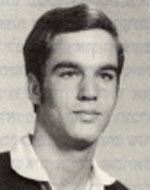Hefer, On
On, son of Ada and Shaul, was born on 15.2.1953 in Tel Aviv and studied at the Yehuda Maccabee Elementary School in his hometown and completed his studies in the bilingual program at the Herzliya Hebrew Gymnasium. His first life, as his family and his friends affectionately called him, was fraught with innumerable diseases, but he overcame all of them and became a healthy and strong young man. The “Blue Box” – the Jewish National Fund’s fund – is soon evident in its friendly attitude and willingness to help others. He was very fond of the French language and chose to study in a bilingual program, but he did not abandon Hebrew either. His knowledge of Hebrew grammar was profound And in the Moshe Sharett competitions, he won several prizes for his proficiency in Hebrew language. When he was in the eleventh grade, he wrote a wide-ranging work on “linguistic proofs for the period of the composition of the Book of Ecclesiastes and the Book of Esther,” and won praise and praises, but not only in the spirit world, Of the Gadna and devoted much of his time to the sport of karate. In 1971 he won the Israeli championship in a brown belt as a summary of his achievements in Karate. He did not see karate as a mere spectacle sport, but a purely defensive sport. A responsible and devoted boy was on the run. When his family was troubled by the problems, his pleasant appearance helped to calm the atmosphere at home. On was serious about his approach to life and understood the importance of saving. “Money should be spent only on necessary things,” he said. Once, when the gymnasium was suspended, he found work and earned a good salary as a teacher in the elementary school he attended. With the money he saved, he paid for his driving lessons. He vehemently refused to take money from his parents for this purpose. On grew up and became a mature and alert boy, to the satisfaction of his parents and admirers. On was drafted into the IDF at the beginning of August 1971. At first he wanted to serve as a pilot in the air force, but his request was rejected for medical reasons: “I will go where they will find me necessary to send me.” B. participated in the pursuit of terrorists in the Lower Galilee, during which he and his comrades assassinated two wanted terrorists, and also worked to bring back deserters and absentees into the ranks of the IDF. With his persuasive power and wisdom, he gained the trust of his listeners. In August 1972 he took a course in paramedics, and found great satisfaction in his role as a paramedic. When he was asked if he would study medicine when he was discharged from the army, he had already decided to learn Hebrew language, when the Yom Kippur War broke out, Onon’s unit at the Hermon outpost on the northern front, One of the reservists who served with him told him that he had volunteered to go to one of the missions in his place, because he himself was ill and the commander demanded that the patient go on a mission, and insisted that a sick person should not be allowed to go to work. Hermon outpost In the midst of the 10th of Tishrei 5740 (October 6, 1973), Onon went to bring the materials of Chabad Yes. He went down to the lower floor of the post and did not come back. At first he was declared missing. When his body was identified, he was temporarily buried in Kibbutz Lohamei Hagetaot. A year later he was laid to rest in the military cemetery in Kiryat Shaul. Survived by father, mother and sister.After his fall, he was promoted to sergeant. In a letter of condolence to the bereaved family, the unit commander wrote: “On he performed his duties as a paramedic in a perfect and exemplary manner, courageously, with devotion and loyalty.” Corporal Hefer On was killed at the fall of the Hermon outpost, “The soldiers of the battalion in the Golani Brigade published a pamphlet in memory of the soldiers of the battalion, who fell in the Yom Kippur War, and included memoirs and remarks about the character and manner of Onfer Hefer. Hebrew University of Tel Aviv.
